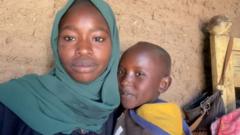The latest travel ban imposed by the Trump administration has intensified hardships for individuals from conflict-affected nations seeking refuge in the United States, blocking crucial opportunities for safety and new beginnings.
Trump's Travel Ban Exacerbates Crisis for Refugees from War-Torn Countries

Trump's Travel Ban Exacerbates Crisis for Refugees from War-Torn Countries
New travel restrictions hinder escape routes for those in need of sanctuary
In the midst of ongoing turmoil, citizens in Myanmar—a country beleaguered by a military coup, civil strife, and natural disasters—are facing a fresh hurdle as President Trump's recently announced travel ban has now taken effect. This sweeping measure was revealed at a press briefing where the president articulated his aim to curb immigration from nations he identified as posing significant threats, including not only Myanmar but also Afghanistan, Chad, and several others.
The travel restrictions, which were set in motion effective immediately, deny entry to individuals from 11 different countries, including Myanmar, where the populace has grappled with a harsh military regime and escalating violence. The political instability and humanitarian crises unfolding in these regions have resulted in many yearning for a chance to seek asylum in the U.S., a hope that has now been extinguished by this prohibition.
“America's safety comes first,” Trump stated on social media, emphasizing the intention behind the order. However, this stance has drawn criticism for leaving countless individuals exposed to ongoing violence and political persecution without pathways for relief or refuge.
Moreover, the travel ban extends to tourists and students from an additional seven nations—Burundi, Cuba, Laos, Sierra Leone, Togo, Turkmenistan, and Venezuela—further narrowing the scope for those aiming for a new life in a safer environment. As the global community witnesses the fallout of these restrictions, the impact on vulnerable populations continues to raise critical humanitarian concerns.
The travel restrictions, which were set in motion effective immediately, deny entry to individuals from 11 different countries, including Myanmar, where the populace has grappled with a harsh military regime and escalating violence. The political instability and humanitarian crises unfolding in these regions have resulted in many yearning for a chance to seek asylum in the U.S., a hope that has now been extinguished by this prohibition.
“America's safety comes first,” Trump stated on social media, emphasizing the intention behind the order. However, this stance has drawn criticism for leaving countless individuals exposed to ongoing violence and political persecution without pathways for relief or refuge.
Moreover, the travel ban extends to tourists and students from an additional seven nations—Burundi, Cuba, Laos, Sierra Leone, Togo, Turkmenistan, and Venezuela—further narrowing the scope for those aiming for a new life in a safer environment. As the global community witnesses the fallout of these restrictions, the impact on vulnerable populations continues to raise critical humanitarian concerns.




















